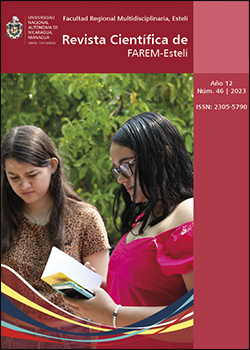Evaluation of the 1D hydraulic simulation of a natural channel of short length, generated from the use of ALOS PALSAR data
DOI:
https://doi.org/10.5377/farem.v12i46.16491Keywords:
Hydraulic simulation, ALOS PALSAR, natural channelAbstract
The results of the 1D hydraulic simulation of a short natural channel, obtained from the use of the ALOS PALSAR Digital Elevation Model (DEM) as a source of topographic information, were evaluated. A simulation of the study area was developed using a DEM made by means of a topographic survey with a total station, from geodetic points properly georeferenced in the study area; this was considered as the reference to evaluate the simulation using ALOS PALSAR data. To obtain the design flow, a hydrological simulation of the microbasin with drainage towards the beginning of the model channel section was carried out. The channel hydraulics were simulated considering the information from the topographic survey as a reference, and contrasting it with the simulation obtained from the remote sensor. The results obtained from the NSE and RSME statistical metrics show that the use of the ALOS PALSAR DEM for the hydraulic simulation of the channel under study, generates significant variations with respect to the results obtained when using a DEM obtained by a higher precision technique, such as the field survey with a topographic station, which indicates that this terrain model is not advisable to use when high precision results are required in large scale scenarios.
Downloads
References
Aparicio Mijares, F.J. (1992). Fundamentos de hidrología de superficie. Editorial Limusa, S.A. de C.V. Grupo Noriega Editores
ASF DAAC. (2015). Radiometrically Terrain Corrected ALOS PALSAR products, product Guide. Retrieved from https://asf.alaska.edu/wp-content/uploads/2019/03/rtc_product_guide_v1.2.pdf
Anthi-Eirini K. Vozinaki, Giasemi G. Morianou, Dimitrios D. Alexakis & Ioannis K. Tsanis (2017). Comparing 1D and combined 1D/2D hydraulic simulations using high-resolution topographic data: a case of study of Koiliaris Basin, Greece. Hydrological Sciences Journal, 62, Issue 4. https://doi.org/10.1080/02626667.2016.1255746
Bhuyian, Md. N., Kalyanapu, A.J & Nardi, F. (2014). Approach to Digital Elevation Model Correction by Improving Channel Conveyance. Journal of Hydrologic Engineering, 20, Issue 5. https://doi.org/10.1061/(ASCE)HE.1943-5584.0001020
Bello Herrera, A.M. y Huete Medrano, L.A. (2013). Modelación de la red de drenaje pluvial de la Sub cuenca III de la cuenca sur de la ciudad de Managua (Tesis de Licenciatura, Universidad Centroamericana). Retrieved from http://repositorio.uca.edu.ni/1435/
Cook, A. & Merwade, V. (2009). Effect of topographic data, geometric configuration and modeling approach on flood inundation mapping. Journal of Hydrology, 377, 131-142. https://doi.org/10.1016/j.jhydrol.2009.08.015
Chow, V.T. (1994). Hidráulica de Canales Abiertos. Editorial McGraw Hill Interamericana, S.A. Bogotá, Colombia
Chow, V.T., Maidment, D.R y Mays, L.R. (1994). Hidrología Aplicada. Editorial McGraw Hill Interamericana, S.A. Bogotá, Colombia
Campo, A.M., Gentili, J y Silva, A. (2016). Comparación de DEM generados a partir de distintas fuentes de datos. Cuenca del Arroyo Sauce Corto, Sistema de Ventania, Argentina. Geografía y Sistemas de Información Geográfica, 8, 34-55. Retrieved from https://ri.conicet.gov.ar/handle/11336/49675
Eastman, J.R. (2012). IDRISI SELVA, Guía SIG y Procesamiento de Imágenes. Clark University. Retrieved from https://clarklabs.org/wp-content/uploads/2016/10/IDRISI-Selva-Spanish-Manual.pdf
Felicísimo, A.M. (1994). Modelos Digitales del Terreno: introducción y aplicaciones en las ciencias ambientales. Pentalfa Ediciones
Fallas, J. (2007). Modelos Digitales de Elevación: teoría, métodos de interpolación y aplicaciones
Gámez Morales, W.R. (2009). Texto Básico de hidrología. Editronic, S.A. Universidad Nacional Agraria
Fundación Amigos del Río San Juan. (2013). Plan Municipal de Ordenamiento y Desarrollo Territorial 2012-2022 Municipio de Ticuantepe
Hydrologic Engineering Center. (2016). River Analysis System HEC-RAS Hydraulic Reference Manual. U.S Army Corps of Engineers
Hydrologic Engineering Center. (2000). Hydrologic Modeling System HEC-HMS, Technical Manual Reference. U.S Army Corps of Engineers
Hernández Vega, A.L. y Rivas Albuquerque, E.M. (2017). Evaluación hidrotécnica del puente Boaquito en la comarca Boaquito, Boaco (Tesis de Licenciatura, Universidad Nacional de Ingeniería). Retrieved from https://ribuni.uni.edu.ni/2471/
Instituto de Hidrología, Meteorología y Estudios Ambientales. (2017). Guía metodológica para la elaboración de mapas de inundación. IDEAM. Retrieved from http://documentacion.ideam.gov.co/cgi-bin/koha/opac-detail.pl?biblionumber=38247
Instituto de Hidrología, Meteorología y Estudios Ambientales. (2018). Protocolo de modelación hidrológica e hidráulica. IDEAM. Retrieved from http://documentacion.ideam.gov.co/cgi-bin/koha/opac-detail.pl?biblionumber=38314
INETER., UNI., ANA., GIZ-PROATAS. (2014). Cuencas hidrográficas de Nicaragua bajo la metodología Pfafstetter. Retrieved from http://proatas.org.ni/media/flatpages/Album_Cuencas_Nic_res_reduc.pdf
Linsley, R.K., Kohler, M.A y Paulus, J.L. (1977). Hidrología para ingenieros. Editorial McGraw Hill Latinoamérica, S.A. Bogotá, Colombia
Md Ali, A., Solomatine, D.P. y Di Baldassarre, G. (2015). Assesing the imapct of diferente sources of topographic data on 1-D hydraulic modelling floods. Hydrology and Earth System Science, 19, 631-643. https://doi.org/10.5194/hess-19-631-2015
Mejía Marcacuzco, J.A. (2012). Hidrología Aplicada. Universidad Nacional Agraria La Molina
Monsalve Sáenz, G. (1999). La hidrología en la Ingeniería. Alfaomega Grupo Editor S.A. de C.V
Moriasi, D. N., Arnold, J. G., Van Liew, M. W., Bingner, R. L., Harmel, R. D., & Veith, T. L. (2007). Model evaluation guidelines for systematic quantification of accuracy in watershed simulations. Trans. ASABE, 50(3), 885-900. Retrieved from moriasimodeleval.pdf (tamu.edu)
Mamani, R., Llanchipa Ramírez, D. (2020). Definición de zonas de inundación mediante el modelo de simulación HEC-RAS en la cuenca baja del río Coata-Puno (Tesis de Licenciatura, Universidad Peruana Unión). Retrieved from https://repositorio.upeu.edu.pe/handle/UPEU/3316
MTI. (2008). Manual para la revisión de estudios hidrotécnicos de drenaje mayor. Ministerio de Transporte e Infraestructura – División General de Planificación
Monge Rodríguez, N. & Mueses, A. (2013). Comparación de cálculos de niveles de inundación entre un análisis hidrológico e hidráulico existente y un modelo digital del terreno. Respositorio. Retrieved from Universidad Politécnica de Puerto Rico. https://prcrepository.org/xmlui/handle/20.500.12475/896
Ramos Lopinta, J.L. (2019). Identificación de zonas con riesgo a inundación por máximas avenidas probables del río Majes en el tramo Dique – Punta Colorada, Arequipa Perú (Tesis de Licenciatura, Universidad Peruana Unión). Retrieved from https://repositorio.upeu.edu.pe/handle/UPEU/2345
Racca, J.M. (2007). Análisis hipsométrico, frecuencia altimétrica y pendientes medias a partir de modelos digitales del terreno. Boletín del Instituto de Fisiografía y Geología, 77(1-2), 31-38. Retrieved from https://rephip.unr.edu.ar/bitstream/handle/2133/970/BIFG_77_31.pdf?sequence=1&isAllowed=y
Vergara Ibacache, V.M. (2016). Análisis comparativo de áreas de inundación mediante diferentes modelos digitales del terreno (Tesis de Licenciatura, Universidad del Bío Bío). Retrieved from http://repobib.ubiobio.cl/jspui/handle/123456789/2277
Villón Béjar, M. (2006). Hidrología Estadística. Editorial Tecnológica de Costa Rica.
Published
Issue
Section
License
Copyright (c) 2023 Revista Científica de FAREM-Esteli

This work is licensed under a Creative Commons Attribution-NonCommercial-ShareAlike 4.0 International License.



